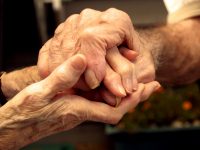It’s well known that as we age, keeping relationships with friends and family thriving can become more difficult. Younger generations become busy with their own nuclear families, activities can become harder to participate in physically and mentally, and for those who are blessed to survive a long time, many people in their core group simply die out.
And so, while living long can be a point of pride it can also be accompanied by a large sense of loss. Having a support group around, such as a religious group, neighbors, or a welcoming group at a seniors’ center can be essential to fight off these feelings and social isolation.
In fact, science has gone so far as to say that having an active social life in older age can actually play a key role in doing more than just keeping us involved: it can help to fight off the onset of diseases like dementia.
But a study out of Amsterdam is putting a new twist on things. It seems that joining just any old activity group in order to keep busy might not be the ticket. It needs to be meaningful. And even then, it might not matter.
In the study, researchers looked at the association between social isolation due to living alone, being unmarried, or living without social support and having feelings of loneliness. They then correlated those feelings with the development of dementia.
The study looked at over 2000 older people without dementia who were living in community living situations and followed it them for three years.
What did it turn up? It was found that older persons with feelings of loneliness were more likely to develop dementia than people who didn’t feel so alone. But simply being alone wasn’t a risk factor.
The old adage that one can feel alone in a crowd seems to apply.
Is it feeling lonely that helps to cause dementia, or do the early stages of dementia make a person experience feelings of loneliness because of what’s happening in their brain? It’s uncertain.
Researchers did state that feeling alone could be a signal that an early stage of dementia is setting in.
(Which isn’t to say that if you’re feeling lonely on a Saturday night that you might be losing your capacities, likely not. But for some, experiencing on-going feelings of loneliness in older age could be an indicator that something is happening. It might not simply be a lack of being around good friends.)
For the younger generation who might be quick to cast judgement, (I know I do), here’s a helpful outcome: if Uncle Al prefers to sit by himself most of the time, pondering life, and he doesn’t really want to join the bowling group, it looks like that could be OK. Which is good to know, because sometimes seeing the disconnect can be disconcerting.
What’s next? Scientists are saying that developing a better understanding of what being lonely actually is, scientifically, can help to improve outcomes in older persons at risk.
Photo Credit: Photographee.eu/Shutterstock












